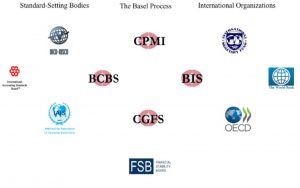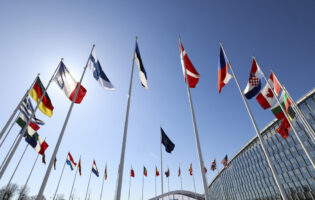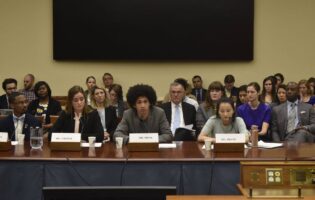International Financial Regulatory Politics after the Crisis: Toward a New Progressive Era
Vincent Dreher
Otto Suhr Institute for Political Science, Free University Berlin
Vincent Dreher was a DAAD/AICGS Research Fellow in October-November 2016. He is Research Associate at the Center for International Political Economy at the Otto Suhr Institute for Political Science of the Free University Berlin. He is currently pursuing a PhD on the subject of international financial market regulation after the crisis of 2007-09, with a focus on the newly created Financial Stability Board. Among his recent conference contributions are papers on financial regulation in Eastern Asia, the role of transnational experts in international regulatory institutions, and political and economic challenges in the Eurozone. For a paper on the regulatory initiative addressing systemically important financial institutions, he received the Best Graduate Student Paper Award 2016 of the International Political Economy section of the International Studies Association (ISA). His teaching experience at the Otto Suhr Institute includes courses on the history of international money and finance, the politics of economic growth, and modern transformations of the state. Mr. Dreher holds an M.A. in International Relations from Free University Berlin, Humboldt University Berlin, and University of Potsdam, a Graduate Diploma in Economics from the University of Essex, and a B.A. in Political Science from the University of Bremen. His research has been funded by the Friedrich-Ebert-Foundation and the DAAD.
He is a 2016-2017 participant in AICGS’ project “A German-American Dialogue of the Next Generation: Global Responsibility, Joint Engagement,” sponsored by the Transatlantik-Programm der Bundesrepublik Deutschland aus Mitteln des European Recovery Program (ERP) des Bundesministeriums für Wirtschaft und Energie (BMWi).
The Global Financial Crisis of 2007-09 ended a two-decade period of steady economic growth and stable inflation in the world’s advanced markets, the so-called “Great Moderation.”[1] Since the mid-1980s, this long-term stabilization in macroeconomic indicators had provided the grounds for continuous cross-border integration across financial markets, trade relations, and societies, giving way to an unprecedented degree of globalization.
The immediate policy response during and after the fateful fall of 2008 featured intense collaboration among representatives of the world’s major economies to restore and maintain the height of global integration as reached in the mid-2000s. In doing so, these internationally-oriented policy actors revived and enhanced international institutions, invited upcoming economies in East and South, and drove policy development for common financial rules across the globe. Against diverging interests, institutional inertia, and deviating domestic standards, a global rule framework for finance slowly but persistently took shape.
The election of Republican Party candidate Donald Trump as president of the United States on November 8, 2016, has presumably dealt a fatal blow to the recently slowing international reform agenda. While the policy stances of the new administration are still in flux, lessons from the last Republican presidency may be indicative. Under the presidency of George W. Bush in 2000-08, the U.S. government and domestic regulatory agencies showed little interest for international cooperation over financial regulation.[2] At the same time, on the other side of the Atlantic support for international financial standards is equally weak, as illustrated by dismissive remarks by EU Commission officials and member state representatives over recent adjustment negotiations regarding risk-weighting in Basel III bank capital standards.[3]
These developments point toward a further strengthening of centrifugal forces, and the ultimate abandonment of envisioning a globally-integrated system. Because of all the discord the financial crisis revealed, one conclusion appears most definite: globally-integrated markets require a globally-integrated regulatory system. A globally-integrated regulatory system in turn requires agreement among the world’s leading economies over common regulatory structures. If efforts on such international regulatory cooperation fail, global markets will fail—whether through slow disintegration over time or through sudden massive crashes, it cannot be had both ways.Yet whatever the future of international financial regulation will bring, it is nonetheless pressing to understand why and when international cooperation over financial regulation actually worked in those past years, and why and when it did not. Whatever follows in terms of financial regulatory cooperation in the coming years, it will build on the remnants, or be it the ruins, of past cooperation. Some of the post-crisis regulatory policy development projects proved comparatively successful in forging strengthened international rules, while others struggled to overcome institutional discrepancies and diverging interests. My PhD thesis analyzes and compares five of the post-crisis financial regulatory initiatives in the attempt to discern driving factors in the regulation of finance and get a glimpse at the perennial question: who sets the rules for global finance? The following pages will provide an overview of my preliminary research results.
The essay will end by stressing the importance of a question our societies need to engage with: what kind of globalization do we want? I am convinced that the riches and stability some of us have come to enjoy over the past decades, in particular in the advanced economies, will wax and wane with the degree of international integration. Yet fundamental questions of modern statehood in a global world—covering issues such as unregulated cross-border capital flows, uneven international corporate taxation, and challenges arising from new frontiers in cyberspace—have not been answered, not at the national and much less at the international level. And such discussions cannot be confined to expert circles around central bank and regulatory agency groupings, as has been largely the case in recent financial regulatory reforms. These discussions lie at the heart of the question of how to live in modern societies, and thus must be addressed collectively.
Informed by my research on the international monetary and financial system over the past four years, I hold the firm belief that any consequential response requires nothing short of a New Progressive Era.
The G20 Vows to Reform the International Financial Regulatory System
The Global Financial Crisis of 2007-09 had been long in the making, with first ruptures in the U.S. economy appearing in the course of 2006. When the investment bank Lehman Brothers filed for bankruptcy on September 15, 2008, global markets imploded. In response, central bankers and policymakers the world over united in executing unprecedented measures to counter the downfall. In order to coordinate immediate crisis management actions, as well as foreseeing a strengthening of crisis prevention structures, officials in leading markets revived dormant institutions of international cooperation. The Group of Twenty (G20), founded in 1999 to provide a platform for central bank governors and finance ministers of the world’s nineteen largest markets, was elevated as a grouping of state leaders and met for the first time in November 2008 in Washington, DC.[4] The Financial Stability Forum, founded in 1999 as a meeting place of regulatory officials from central banks, financial regulators, and finance ministries, was reestablished as the Financial Stability Board (FSB) at the second G20 summit in April 2009 in London.[5] There, the G20 leaders provided the FSB with the mandate to oversee and drive the international regulatory response to address the revealed vulnerabilities in the global financial system. For that purpose, the body’s membership was expanded beyond advanced market economies and international financial centers to include emerging markets as represented in the G20. Furthermore, the FSB was also embedded into a structure of international regulatory bodies and international organizations, whose foundations date back as far as the creation of the Bank for International Settlements in the year 1930.
The FSB and the Regulatory Financial Architecture Get to Work
With the ultimate organizational form and relationship to preexisting bodies still in flux in mid-2009, the FSB and its peers pressed ahead for devising a new regulatory framework for cross-border markets. The following graph provides an overview of the bodies involved: four international organizations, which fulfill auxiliary functions in terms of data collection, the provision of regulatory templates, and institutional support; four central bank and bank regulator bodies linked to the Bank for International Settlements located in the landmark tower in Basel, Switzerland (thus dubbed the “Basel process”); and four regulatory bodies, setting international standards for banking, securities markets, insurance, and accounting. In practice, these bodies and functions are not as neatly separated, and regulatory reform processes may crisscross the various forums.

International Regulatory Politics Works…When Certain Conditions Apply
In my PhD thesis, I develop a theoretical framework for explaining policy outcomes of international financial regulatory negotiations. The model starts by assuming that each international policy initiative is overseen by a policy entrepreneur. This entrepreneur may be an individual, a regulatory department, or a whole agency; what is crucial is that the policy entrepreneur enjoys the full support by its home jurisdiction. Why would a jurisdiction give full support to an international regulatory initiative, meaning it provides ample staff support, institutional resources, and money? This occurs when a jurisdiction sees its home market as unstable in the particular reform area in question, but fears competitive disadvantages when strengthening rules unilaterally at home.[7] This is because first its home financial firms may lose market share vis-à-vis less regulated foreign firms; and second, the home market itself may become unattractive for international capital. Therefore, the jurisdiction benefits disproportionally from new international rules, while other economies may lend general support due to their concern over global financial stability. As the crisis has shown, when market failure goes global, everybody suffers.
However, the full support by selected jurisdictions does not suffice for profound international regulatory change to take place. At the international level, it requires a regulatory opportunity structure,[8] which favors the completion of the regulatory reform initiative because of flexible and decentral structures, weakness of vested interests, and a broad approach to financial regulation. In contrast, rigid international institutions inhibit reform processes.
In my thesis, I identify the development of new bank resolution regimes and the creation of the legal entity identifier system as cases of profound regulatory policy change: both cases featured a jurisdiction particularly interested in the completion of the initiative, the U.K. or the U.S., and both initiatives were taken to the FSB, a regulatory opportunity structure in my framework. The cases of bank capital negotiations at the Basel Committee (BCBS), capital market regulation at the International Organization of Securities Commissions (IOSCO), and shadow banking regulation at the FSB show that the lack of full state support or the lack of an opportunity structure, or both, results in subdued policy change.
In conclusion, I manage to show that under certain conditions international regulatory politics does indeed lead to fundamental policy change. Due to my case selection, I furthermore qualify other theoretical explanations for international regulatory change and blockage; not by arguing that great power interests,[9] influence by financial firms,[10] political saliency,[11] and path dependency[12] do not matter, but by showing that these factors matter differently under different conditions.
International Regulatory Politics May Work – But For What Purpose?
Yet despite these respectable advances in strengthening the international regulatory framework, the global economic and financial system is drifting apart—a trend only accelerated by Brexit in June and the U.S. elections in November of the year 2016.
Outrage and frustration among peoples in the world’s most integrated economies cast grave shadows on the idea of internationally connected financial markets and economies as such. But what needs to be stressed vigorously: a world of integrated financial, economic, and also political entities has been more peaceful on average than any other arrangement in history.[13] Furthermore, the political, economic, and social transformations of the past two centuries, accelerating during times of high integration, have made the world’s societies richer, safer, and healthier.[14] At the same time, there is little doubt that the variant of international integration unfolding in past decades has benefited some segments of societies disproportionally more so than others.[15] International integration does result in total welfare gains—but it is indifferent to welfare distribution among and within jurisdictions.
The international financial regulatory reform project of the past seven years attempted to forge common rules for maintaining the openness of the global financial system while softening the damage of its regular disruptions. What the international regulators did not, and cannot, do is pose the more fundamental questions: what kind of global financial system do societies want? What purpose is finance supposed to serve in support of the real economy, what purpose in terms of offering investment opportunities for insurance companies and pension funds across the world? These questions apply to finance as much as they apply to international trade and its distributive consequences, corporate taxation and regulatory competition, and macroeconomic governance. Tackling these crucial issues of political and economic organization in our societies has largely been evaded over the past years, even decades. Time and again, we witness that markets and market-based orders may provide for tremendous benefits; but outcomes also include inequality, disruption, and even economic devastation.
Over a century ago, the United States faced a societal backlash over unfettered markets in the wake of rapid technological progress and early industrialization. This gave rise to the political movements of the Progressive Era of the late nineteenth century, where the relationship between states and markets, between regulatory politics and economic activity, were rethought and rearranged. Among the outcomes of the ensuing political processes were the forging of rules for regulating economic activities, decisive market-correcting measures, and counteraction to all types of social consequences of rapid technological changes. In view of the increasingly disruptive eruptions across politics, markets, and societies: it is high time for a New Progressive Era, on both sides of the Atlantic.
Vincent Dreher was a DAAD/AGI Research Fellow in October-November 2016. He is a Research Associate at the Center for International Political Economy at the Otto Suhr Institute for Political Science of the Free University Berlin.
[1] Remarks by Governor Ben S. Bernanke at the meetings of the Eastern Economic Association, Washington, DC, February 20, 2004, The Federal Reserve Board, https://www.federalreserve.gov/BOARDDOCS/SPEECHES/2004/20040220/default.htm; Lola Gadea, Ana Gomez-Loscos, Gabriel Pérez-Quirós, “On the greatness of the great moderation,” CEPR’s Policy Portal, 26 October 2015, http://voxeu.org/article/greatness-great-moderation
[2] Paul Blustein, Off balance. The travails of institutions that govern the global financial system (Waterloo: Center of International Governance Innovation, 2013).
[3] Silla Brush, “EU Calls for Sweeping Changes to Basel Bank-Capital Proposal,” Bloomberg Markets, 29 September 2016, https://www.bloomberg.com/news/articles/2016-09-29/eu-calls-for-sweeping-changes-to-basel-bank-capital-proposals
[4] Current G20 membership: Argentina, Australia, Brazil, Canada, China, France, Germany, India, Indonesia, Italy, Japan, Korea, Mexico, Russia, Saudi Arabia, South Africa, Turkey, United Kingdom, United States, European Commission
[5] Current FSB membership: G20 plus Hong Kong SAR, Netherlands, Singapore, Spain, Switzerland, as well as the ten institutions of the International Financial Regulatory Architecture as depicted below.
[6] BIS: Bank for International Settlements (created in 1930); IMF: International Monetary Fund (created in 1944); WB: World Bank Group (created in 1944 as International Bank for Reconstruction and Development); OECD: Organization for Economic Co-operation and Development (created in 1948 as Organization for European Economic Co-operation); CGFS: Committee of the Global Financial System (created in 1971 as Euro-currency Standing Committee); IASB: International Accounting Standards Board (created in 1973 as International Accounting Standards Committee); BCBS: Basel Committee for Banking Supervision (created in 1974 as Basel Committee on Banking Regulations and Supervisory Practices); CPMI: Committee on Payments and Market Infrastructures (created in 1980 as Group of Experts on Payments Systems); IOSCO: International Organization of Securities Commissions (created in 1983); IAIS: International Association of Insurance Supervisors (created in 1994)
[7] See also David Andrew Singer, Regulating capital. Setting standards for the international financial system (Ithaca: Cornell University Press, 2007).
[8] See also Henry Farrell and Abraham L. Newman, “Domestic Institutions beyond the Nation-State: Charting the New Interdependence Approach,” World Politics 66:02 (2014), pp. 331–363.
[9] Daniel W. Drezner, All politics is global. Explaining international regulatory regimes (Princeton, NJ: Princeton University Press, 2007).
[10] Stephany Griffith-Jones, Matthias Thiemann, Leonard Seabrooke, “Taming Finance by Empowering Regulators. A Survey of Policies, Politics and Possibilities,” ed. United Nations Development Programme (2010).
[11] Cornelia Woll, “Lobbying under Pressure: The Effect of Salience on European Union Hedge Fund Regulation,” Journal of Common Market Studies 51:3 (2013), pp. 555–572.
[12] Orfeo Fioretos, “Capitalist diversity and the international regulation of hedge funds,” Review of International Political Economy 17:4 (2010), pp. 696–723.
[13] Karl Polanyi, The great transformation. The political and economic origins of our time (Boston, MA: Beacon Press, 1944, reprint 2001), Chapter 1, “The Hundred Years’ Peace”; Steven Pinker, The better angels of our nature. Why violence has declined (New York: Viking, 2011).
[14] Hans Rosling’s “200 Countries, 200 Years, 4 Minutes – The Joy of Stats,” BBC Four, https://www.youtube.com/watch?v=jbkSRLYSojo
[15] Branko Milanović, Global inequality. A New Approach for the Age of Globalization (Cambridge, MA: Harvard University Press: 2016).









